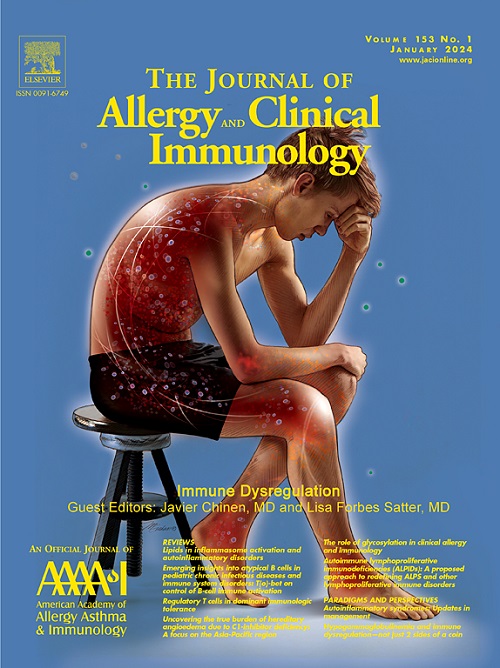Real-life observation of wildfire smoke–impaired COVID-19 vaccine immunity
IF 11.4
1区 医学
Q1 ALLERGY
引用次数: 0
Abstract
Background
Wildfires are increasingly common, with wildfire smoke affecting millions globally; yet, its impact on immune responses is poorly understood.
Objective
This real-world study, conducted on participants in the Pfizer BNT162b2 coronavirus disease 2019 (COVID-19) vaccine trial, examined the effects of wildfire smoke exposure on long-term vaccine immunity.
Methods
We recruited 52 healthy, nonsmoking individuals (aged 26-83 years) who were either vaccinated (group 1 [n = 28]) or injected with placebo (group 2 [n = 24]) during conditions of heavy wildfire smoke. The group 2 subjects underwent vaccination several months later, outside wildfire season. Blood was taken before and 1 month after the vaccine or placebo injections, as well as 6 months after vaccination. We analyzed levels of intracellular cytokines, B-cell, and natural killer (NK) cell markers by flow cytometry, as well as serum immunoglobulin levels against common coronaviruses by using multiplex assays.
Results
A robust spike receptor-binding domain (S-RBD)-specific IgG response was observed 1 month after booster and declined variably 6 months later. Wildfire smoke acutely increased IL-13 expression by CD56bright NK cells at the time of vaccination; this increase negatively correlated with level of anti–S-RBD IgG (r = –0.41; P < .05). Total IgG levels positively correlated with the Air Quality Index measured during vaccination (r = 0.96; P < .01). Similarly to age (but not to sex, body mass index, or race/ethnicity), the 2-week Air Quality Index averages during vaccination showed a significant negative correlation with anti–S-RBD IgG levels 6 months later (r = –0.41; P < .05).
Conclusion
Wildfire smoke may lead to inappropriate immunoglobulin production and diminished vaccine immunity. We highlight a previously unrecognized pathway involving NK cell–derived IL-13 and nonspecific B-cell activation and underscore the significance of environmental exposures in shaping immunity.

野火烟雾损害COVID-19疫苗免疫的现实观察
背景:野火越来越普遍,野火烟雾影响全球数百万人,但其对免疫反应的影响知之甚少。目的:这项现实世界的研究,对辉瑞BNT162b2 COVID-19疫苗试验的参与者进行了研究,研究野火烟雾暴露对长期疫苗免疫的影响。方法:我们招募了52名健康,不吸烟的个体(26-83岁),他们在野火浓烟条件下接种疫苗(1组,n=28)或注射安慰剂(2组,n=24)。第二组受试者在野火季节之外的几个月后接种疫苗。在疫苗或安慰剂注射前、注射后1个月和接种后6个月采血。我们用流式细胞术分析细胞内细胞因子、B和NK细胞标记物,用多重检测分析抗常见冠状病毒的血清免疫球蛋白水平。结果:增强1个月后观察到一个强大的刺突受体结合域(S-RBD)特异性IgG应答,6个月后略有下降。野火烟雾可显著提高接种时cd56亮NK细胞IL-13的表达,且与抗s - rbd IgG呈负相关(r=-0.41, p)。结论:野火烟雾可导致免疫球蛋白产生不适当,降低疫苗免疫力。我们强调了一个先前未被识别的途径,涉及nk细胞衍生的IL-13和非特异性b细胞活化,并强调了环境暴露在形成免疫中的重要性。
本文章由计算机程序翻译,如有差异,请以英文原文为准。
求助全文
约1分钟内获得全文
求助全文
来源期刊
CiteScore
25.90
自引率
7.70%
发文量
1302
审稿时长
38 days
期刊介绍:
The Journal of Allergy and Clinical Immunology is a prestigious publication that features groundbreaking research in the fields of Allergy, Asthma, and Immunology. This influential journal publishes high-impact research papers that explore various topics, including asthma, food allergy, allergic rhinitis, atopic dermatitis, primary immune deficiencies, occupational and environmental allergy, and other allergic and immunologic diseases. The articles not only report on clinical trials and mechanistic studies but also provide insights into novel therapies, underlying mechanisms, and important discoveries that contribute to our understanding of these diseases. By sharing this valuable information, the journal aims to enhance the diagnosis and management of patients in the future.

 求助内容:
求助内容: 应助结果提醒方式:
应助结果提醒方式:


